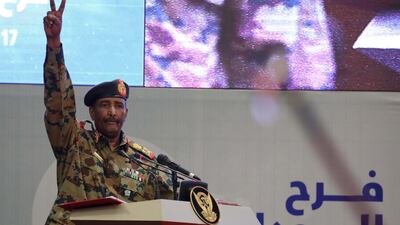Sudan on Wednesday swore in members of a council that will rule for the next three years, the first concrete step toward implementing a landmark power-sharing agreement reached between the military and a protest movement that forced authoritarian ruler Omar Al Bashir from office in April.
Gen Abdel-Fattah Al Burhan, chairman of the Transitional Military Council that ruled Sudan since Mr Al Bashir’s removal, was first sworn in as head of the 11-member Sovereignty Council that will function as a collective presidency until November 2022. Several hours later, nine members of the council were sworn in by Gen Al Burhan himself at the presidential palace in Khartoum, the Sudanese capital.
The nine included four generals and five civilians. The civilians included two women, one of them, Nicola Abdel-Maseeh, is Christian. The 11th member, Mohammed Al-Taayshi, lives in Britain and will be sworn in upon his return later this week.
The swearing-in of the Sovereign Council spelt the end of the transitional military council and signalled the beginning of a rare formal partnership between the military and the opposition that, in theory, will last until late 2022 when free elections are held.
The creation of the Sovereign Council is part of an agreement reached earlier this month and signed at a high-profile ceremony held amid jubilant street celebrations and a wave of optimism on August 17. The agreement outlines a roadmap for Sudan’s transition to civilian rule, including a government of technocrats and a 300-seat legislature to be created in the next three months.
Gen Al Burhan will chair the Sovereignty Council for 21 months, after which a civilian will take over for 18 months.
The nominee for prime minister, economist Abdullah Hamdouk, was scheduled to be sworn in later on Wednesday. Hundreds, many waving Sudanese flags, gathered outside the arrival hall at Khartoum airport to greet him on arrival.
Mr Al Bashir was removed from power by the military on April 11 following four months of street protests against his 29-year, Islamist rule. An alliance of political parties, rebel groups and professional unions borne out of these protests – the Forces of Freedom and Change – negotiated with the military for months in a tortuous process that on occasion looked on the brink of collapse.
The violent break-up by security forces of a sit-in encampment outside the headquarters of the armed forces in Khartoum on June 3 drew a sharp response from the Forces of Freedom and Change, which pulled out of the negotiations. The opposition says nearly 130 were killed in the break-up of the sit-in and that scores remain missing. The power-sharing agreement provides for a thorough and transparent probe into the violence.
The talks resumed following intense, behind-the-scenes mediation by diplomats from Saudi Arabia, the United Arab Emirates, Britain and the United States. Later, envoys from the African Union and neighbouring Ethiopia helped the two sides reach an agreement.
The nomination of two women to the Sovereign Council has been interpreted as a glimpse of a “new Sudan” where inclusion and equality are envisioned to replace the divisions and bitterness created by three decades of war and disenfranchisement under Mr Al Bashir’s tutelage.
Significantly, the Christian member of the council, government legal adviser Ms Abdel-Maseeh, was jointly selected by the generals and the Forces of Freedom and Change. The other female council member is Aisha Al Saeed, who has had a career in education and is a veteran civil society activist.
The transition administration faces a host of serious challenges, including negotiating an end to long-running conflicts in western and southern Sudan. There is also the daunting task of dismantling the “deep state” of regime loyalists planted by Mr Al Bashir over the past 30 years in government, the armed forces and security agencies.
Perilously, overhauling the ailing economy will likely entail the gradual removal of state subsidies on basic commodities like fuel and bread. Past attempts to enact such reforms have been met by street protests. Improving the economy will also likely necessitate an equally sensitive measure: Reducing the massive defence and security budgets that Mr Al Bashir happily sanctioned to maintain his grip on power.
“It’s a revolution and people are expecting milk and honey but, at least in the short term, they will instead get pain,” said a top Western diplomat in Khartoum, alluding to the wave of price hikes likely to follow subsidy cuts.
Ending armed conflicts and effectively eradicating the country’s legendary corruption would likely ease the crunch but, according to the diplomat, continuing emergency aid from Sudan’s backers in the Gulf region is essential to keep the economy afloat in the near and medium future.
The UAE and Saudi Arabia already provided Sudan with $3 billion (Dh11bn) in emergency aid soon after Mr Al Bashir’s removal. Of the $3 billion, $500 million were deposited in the Central Bank to boost foreign currency reserves, while the remainder is being used to finance imports of fuel and basic foodstuffs.































